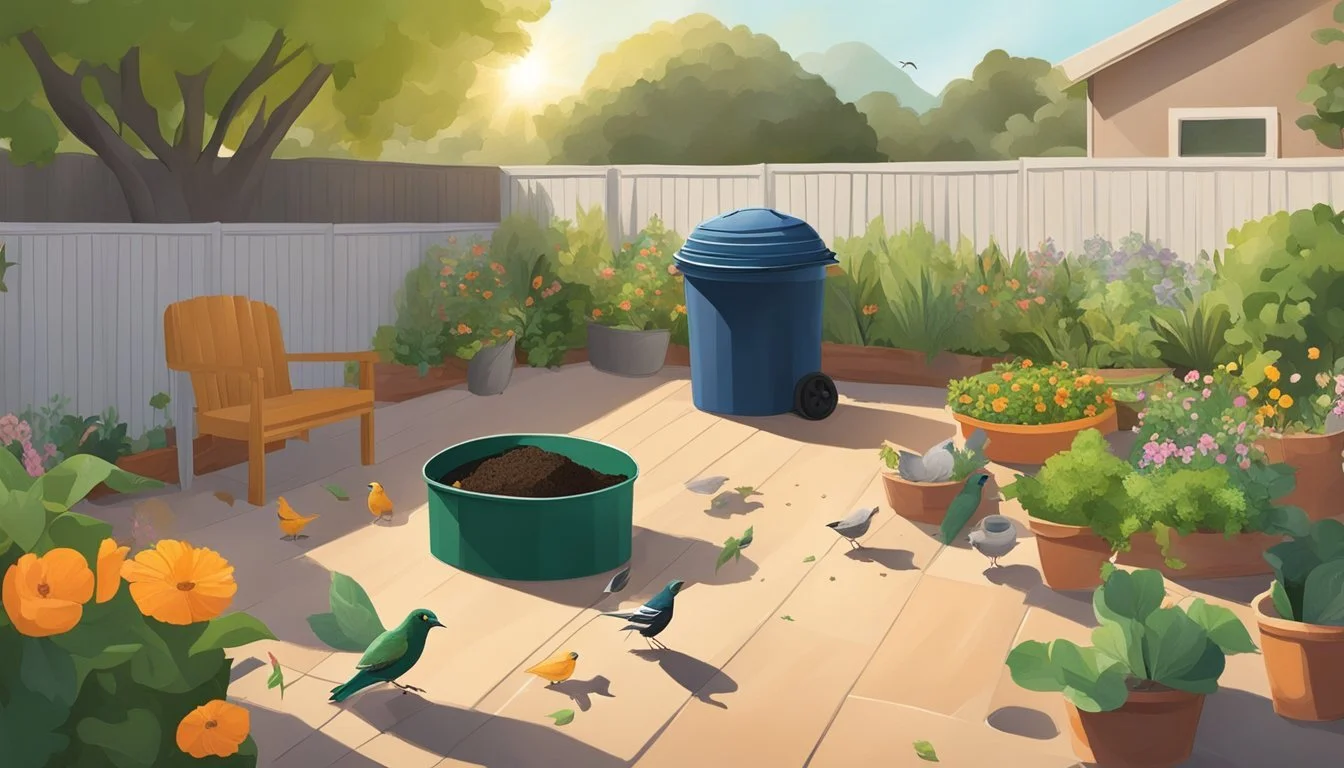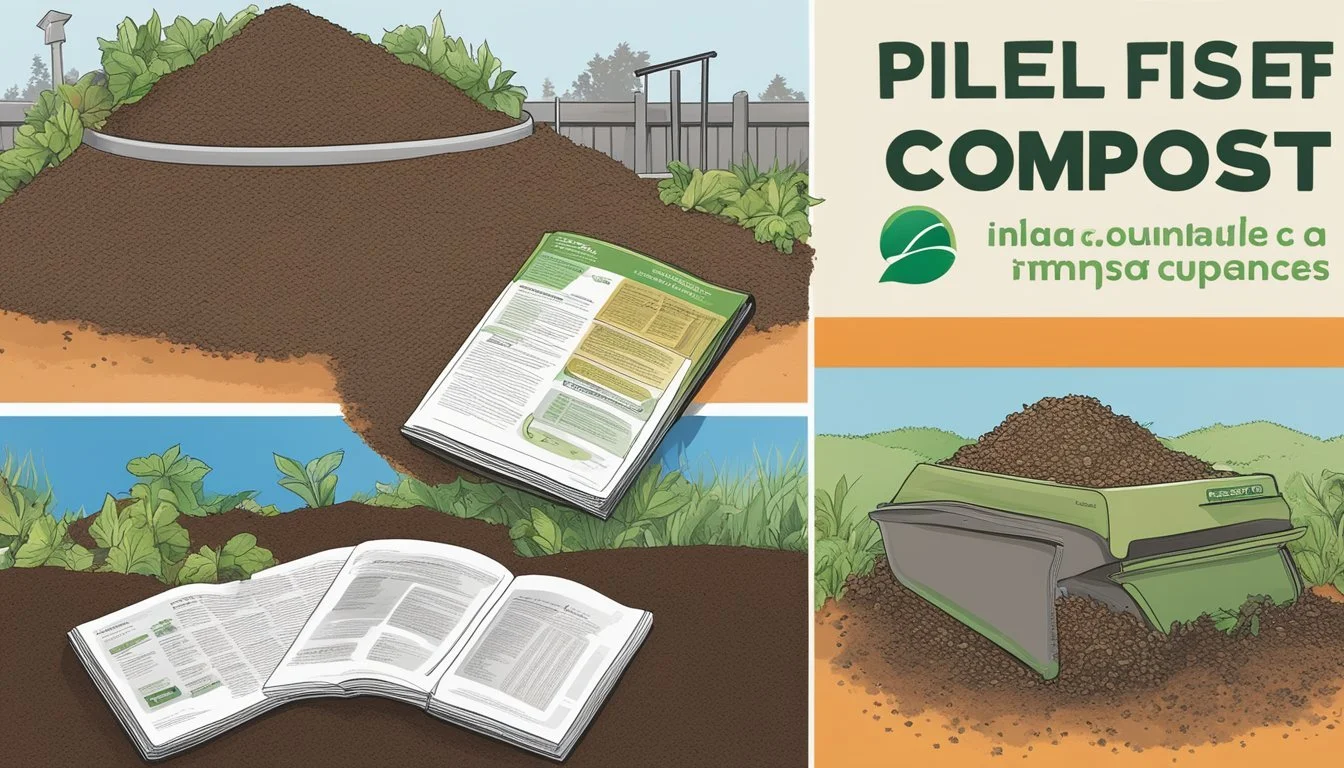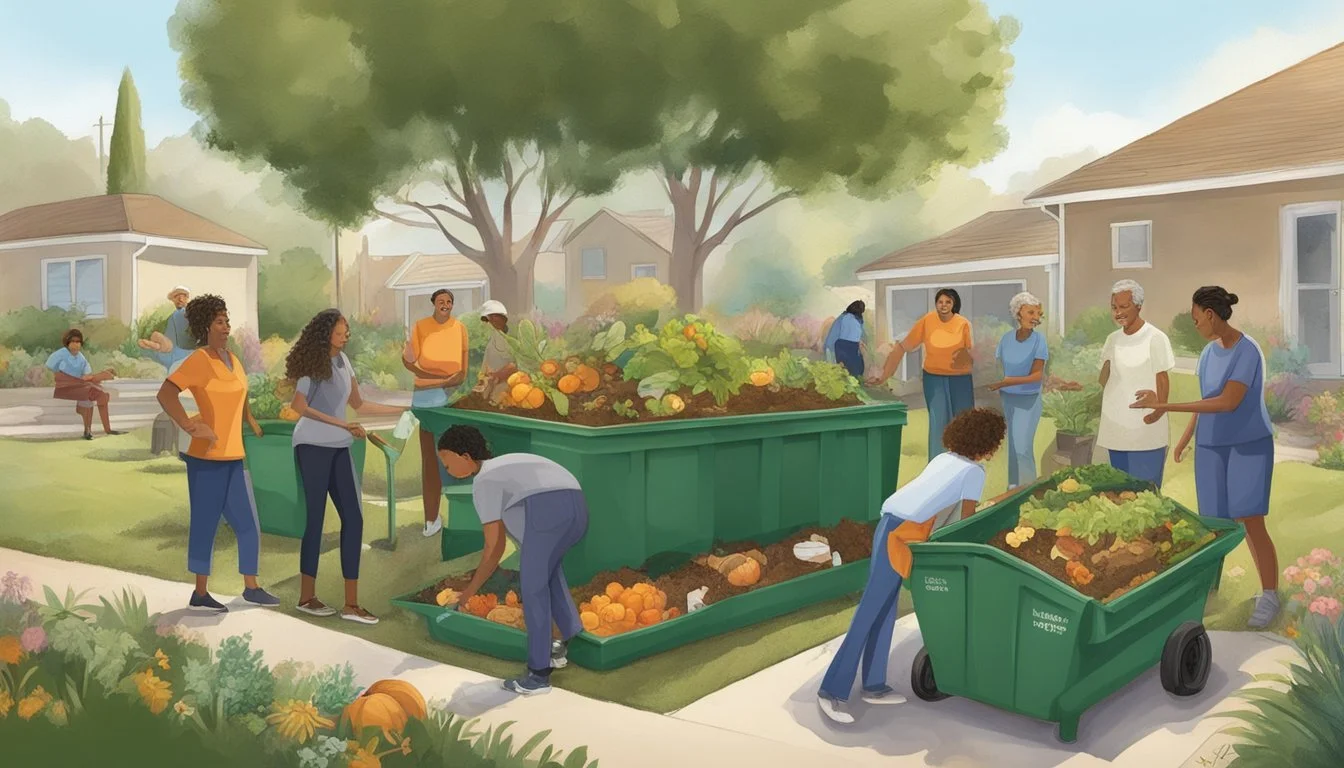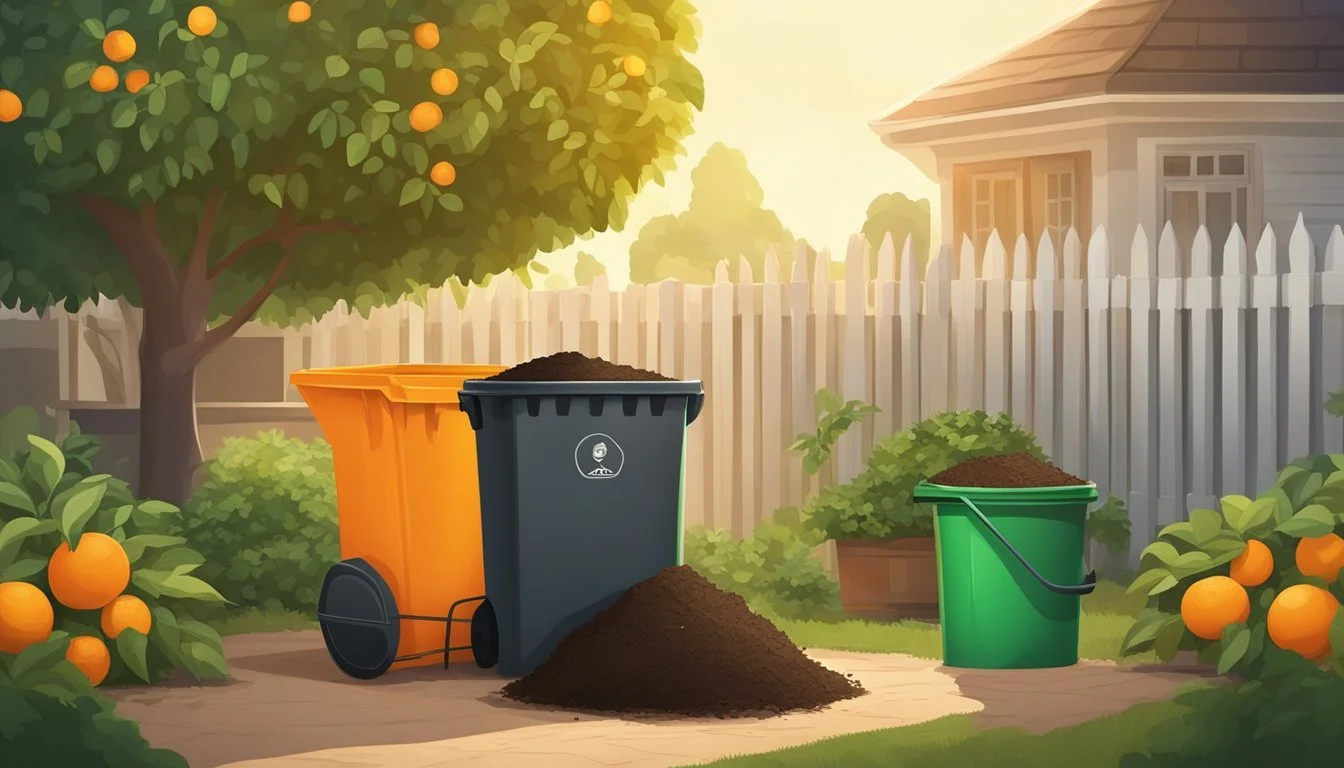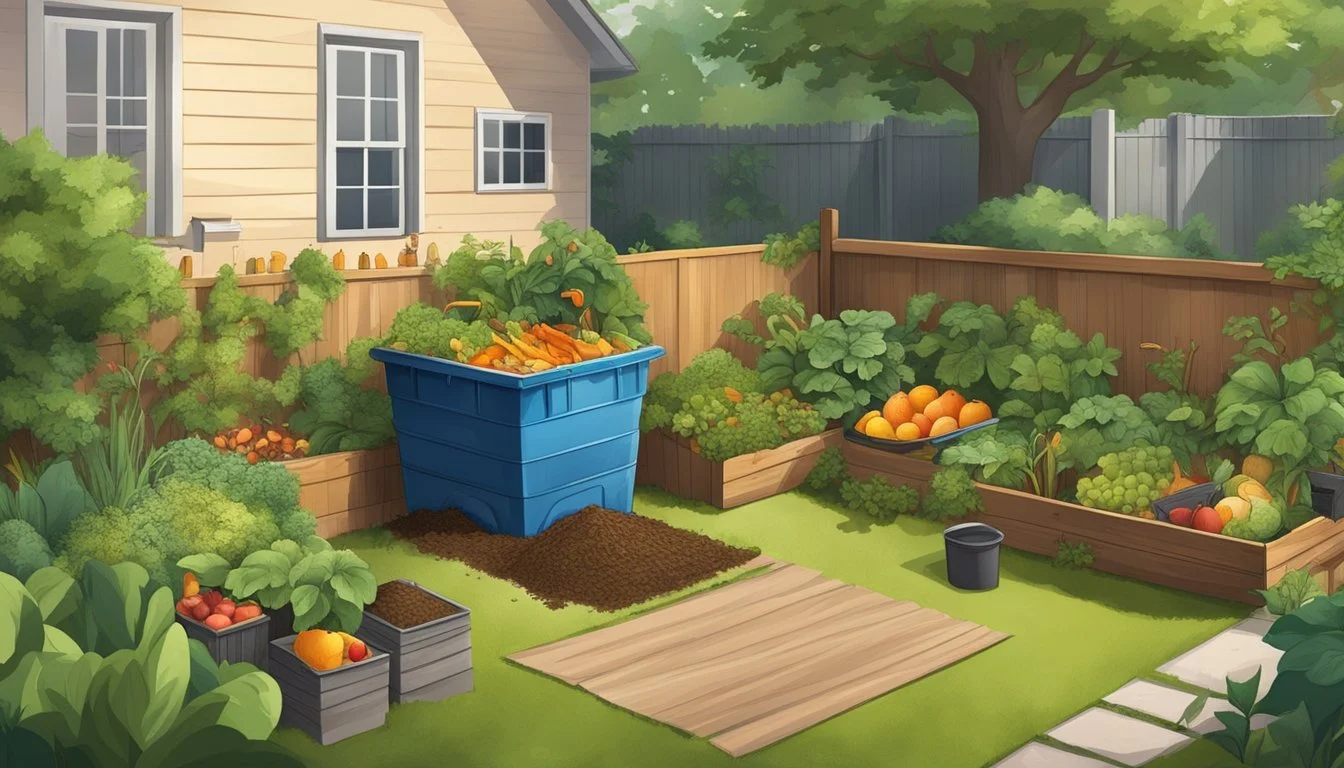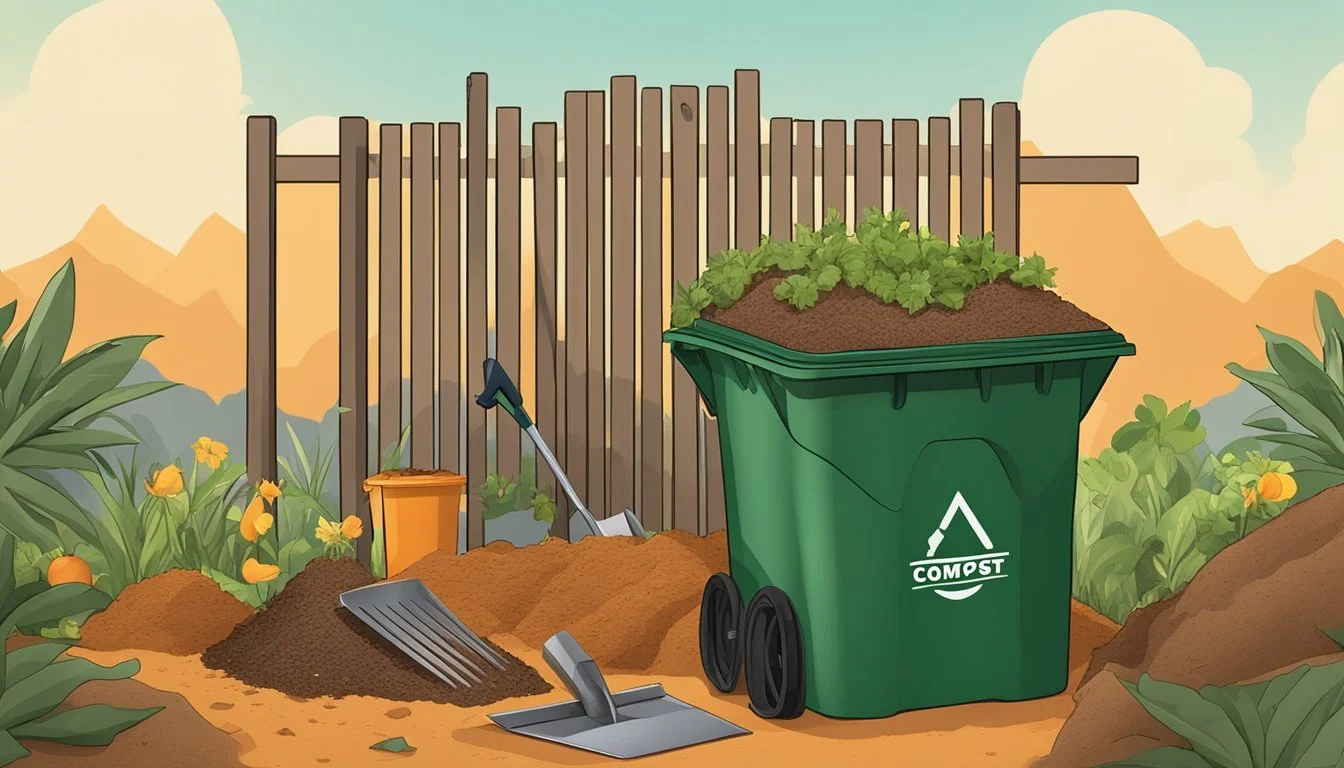Guide to Composting in Orange, CA
Essential Tips for Eco-Friendly Waste Reduction
Composting has become a cornerstone of waste reduction in Orange County, a reflection of the broader commitment throughout California to harness natural processes for environmental benefit. In Orange, CA, residents have access to a spectrum of resources and programs dedicated to transforming organic waste into valuable compost, which can significantly cut down on household waste and provide enrichment for gardens and landscaping.
The State of California's desire to achieve a 75% reduction in solid waste through recycling and composting has led to the implementation of progressive measures in cities like Orange. These efforts are facilitated by organizations and municipal authorities who offer a range of services, from curbside organics recycling programs to educational resources dedicated to teaching residents how to effectively turn their biodegradable waste into nutrient-rich compost. Initiatives, such as a composting awareness campaign by OC Waste & Recycling, underscore the importance placed on composting in the region.
With environmental regulations such as SB 1383 prompting cities and counties to develop procurement programs for composted materials, Orange County's sanitation districts have stepped up efforts to encourage and assist residents in embracing composting. Whether through community giveaway events or helpful online video series, there is continuous support for those looking to contribute to the sustainability of their community by composting at home.
What is Composting?
Composting is a responsible process of recycling decomposed organic materials into a rich soil known as compost. This transformative procedure is instrumental in resource conservation and waste reduction.
Basics of Composting
Composting involves mixing organic materials, such as food scraps and yard waste, in proper proportions to support decomposition. The process relies on four main ingredients:
Nitrogens such as fruit and vegetable scraps
Carbons like leaves and shredded paper
Water to maintain moisture
Air to help aerobic bacteria thrive
To effectively compost, individuals layer green materials (rich in nitrogen) and brown materials (rich in carbon), maintaining an optimal balance that encourages microbes to break down organic matter into nutrient-rich soil. This natural substance can be employed to enhance garden soils, potted plants, and even lawns.
Benefits of Reducing Food Waste
Reducing food waste through composting has substantial environmental impacts. Composting can:
Decrease the amount of waste sent to landfills, where food waste generates methane, a potent greenhouse gas.
Return valuable nutrients to the soil, promoting plant growth and soil health.
Conserve natural resources, as compost can help with water retention in soil, reducing the need for frequent watering.
By composting, homeowners and community members in Orange, CA, play a part in a larger ecosystem, creating compost that sustains plant life and continues the cycle of growth.
Setting Up a Composting System
When establishing a composting system in Orange, CA, homeowners need to select the appropriate type of compost bin, understand the basics of backyard composting, and consider the nuances of worm composting, ensuring a balance of essential elements like moisture and temperature for successful decomposition.
Choosing a Compost Bin
Compost bins come in various shapes and sizes, and the selection depends on individual needs. A closed bin is suitable for those with limited space and concerns about pests. An open bin is more accessible for turning the compost pile but may attract animals. Construction materials can range from wood to plastic, with each having its advantages regarding insulation and durability.
Backyard Composting Essentials
For effective backyard composting, an optimal balance of green and brown materials is crucial. Green materials, such as kitchen scraps and lawn clippings, provide nitrogen, while brown materials, like leaves and sawdust, supply carbon. The compost pile should maintain moisture similar to a wrung-out sponge and require regular turning to introduce oxygen, essential for temperature regulation and decomposition.
Worm Composting Basics
Vermicomposting or worm composting is a method involving worms, commonly red wigglers, to break down organic material. Indoor worm compost bins facilitate composting year-round and are an excellent option for those without backyard space. The essentials of worm composting include a worm bin, bedding made from moist newspaper or cardboard, worms, and food scraps. Regular maintenance of the worm compost bin involves monitoring moisture levels and harvesting nutrient-rich worm castings to enrich the garden soil.
What to Compost
Composting in Orange, CA, contributes to waste reduction and soil health. Understanding what materials are compostable is crucial for effective composting.
Green vs. Brown Materials
Green materials are nitrogen-rich and help microorganisms in the compost pile to thrive. They include:
Food scraps: Vegetable peels, fruit scraps, and coffee grounds
Yard waste: Grass clippings and garden trimmings
Coffee filters and tea bags
Conversely, brown materials provide carbon, aiding in creating the right balance:
Dried leaves, branches, and twigs
Paper products: Newspaper strips, non-coated paper plates, and paper towels (not used with chemicals)
Wood chips and sawdust
A balanced mix of green and brown materials is essential for efficient decomposition.
Items to Avoid in Compost
Certain items should not be composted as they can create odor problems, attract pests, or contain harmful bacteria and chemicals:
Meat: Can attract pests and cause odor
Dairy products: Similar issues as meat and can create an imbalance in your compost
Tissues: If used during illness, they could spread pathogens
Diseased plants: Could transfer diseases back into the garden when compost is used
Correct composting practices avoid composting these materials, ensuring a healthy and effective process.
Maintaining Your Compost
Maintaining a compost pile is a balance of science and art that involves careful monitoring of ingredient ratios, moisture levels, and temperatures to produce nutrient-rich soil while avoiding odors and pests.
Balancing Compost Ingredients
To create compost effectively, one must balance "green" materials, which are nitrogen-rich, with "brown" materials, high in carbon. The ideal ratio for optimal activity is roughly equal parts of greens, such as fruit and vegetable scraps, and browns, like dry leaves and shredded paper. This mix provides the necessary nutrients and structure to support microbial life.
Managing Moisture and Temperature
Properly managing moisture and temperature is critical in a compost pile. Compost should feel like a wrung-out sponge—moist but not soggy. One can manage moisture levels by adding dry brown materials or water, as needed. The pile should maintain an internal temperature between 135-160°F for ideal decomposition without killing beneficial organisms.
Preventing Odors and Pests
To prevent odors and deter pests, such as rodents and flies, it's important to cover fresh compostable material with a layer of browns, which masks the smell and makes the compost less accessible. Regularly turning the compost ensures aeration, minimizes odor, and accelerates the breakdown process. Additionally, one should avoid composting meat or dairy products which can attract unwanted visitors.
Utilizing Finished Compost
The integration of finished compost into various aspects of gardening and landscaping provides essential nutrients and improves soil structure. Its multifaceted uses range from enriching flower beds to fortifying houseplants.
In the Garden
Garden beds thrive when amended with finished compost. It introduces beneficial microorganisms and nutrients, creating a nutrient-rich soil conducive to healthy plant growth. For vegetables and flowers, a 2-3 inch layer of compost worked into the soil before planting can significantly enhance the garden's vitality.
In Landscaping
Compost is valuable in landscaping for its water retention properties and for promoting lush, green lawns. When establishing new turf or maintaining existing grass, evenly spreading a half-inch layer of compost can stimulate root development and soil conditioning. Trees and shrubs benefit from compost mulch as it provides a slow release of essential nutrients and fosters an ideal root environment.
For Houseplants
Indoor plant enthusiasts use compost to rejuvenate houseplants by mixing it into the potting soil or using it as a top-dressing. This practice not only feeds the plants but also improves the soil structure of potted plants, ensuring they remain robust and full of life. A ratio of one part compost to three parts potting mix is recommended to prevent nutrient burn and maintain soil aeration.
Community and Environmental Impact
Community composting programs in Orange, CA, are creating significant positive effects on waste management and environmental sustainability. These efforts directly contribute to achieving the state's waste management goals and reducing the strain on landfills.
Reducing Landfill Impact
Orange County promotes community-scale composting as a sustainable approach to managing organic waste. By turning food waste and green waste into compost, the community considerably decreases the volume of waste sent to landfills. A composting program allows residents to divert compostable materials, which otherwise contribute to landfill mass, thus extending landfill lifespans and mitigating methane emissions.
California’s Waste Management Goals
California has set ambitious goals for waste reduction. This includes a legislative act known as Senate Bill 1383, designed to reduce organic waste disposal by 50% by 2020 and 75% by 2025. To support these targets, Orange, CA has launched strategies such as the distribution of composting bins and increasing recycling efforts. As part of these goals, residents are encouraged to reduce their landfill contributions, help manage organic waste, and participate in recycling initiatives for a more sustainable community.
Local Composting Initiatives in Orange, CA
Orange, CA, demonstrates a progressive approach towards sustainability through its composting initiatives. There's a clear emphasis on education and local policy to reduce landfill waste and encourage community participation.
Orange County Policies
Orange County takes a proactive stance in managing organic waste with regulations aiming for a 75 percent reduction of organic materials to landfills by 2025. A notable effort is the Community Compost Giveaway hosted by OC Waste & Recycling, serving as a perfect example of how local policies foster forward-thinking in waste management.
Composting Education and Workshops
To support composting endeavors, Orange County provides a variety of educational platforms and workshops. The Compost Outreach Program aims to inform residents about the benefits of composting. Furthermore, the UC Master Gardener program often holds Master Composter classes that train and certify local residents, equipping them with the essential knowledge to compost effectively.
Getting Involved
In Orange, CA, both residents and businesses have unique opportunities to actively participate in local composting initiatives. The programs are tailored to cater to different types of organic waste, providing education and supplies to ensure effective green waste management.
For Residents
Residents in Orange County can take advantage of the Community Compost Program, which is designed to encourage the handling and conversion of organic material right at home. Every Orange County resident is eligible for participation in events like the Community Compost Giveaway where compost is offered for free. These events often take place between 7:30 a.m. and noon, representing a prime opportunity for locals to enrich their gardens while reducing landfill burden.
In addition to giveaways, the City of Orange's Organics Recycling Program helps households lower their waste through curbside organics recycling services. Education plays a significant role here, with instructional materials provided on how to sort and manage green waste properly.
For Businesses
Businesses face stringent regulations under CalRecycle’s mandate, which require adherence to SB 1383-compliance by procuring recovered organic materials. The aim is to enhance recycling and composting. Commercial entities must annually purchase items like composted biosolids and mulch, which contributes positively to the organic lifecycle and aligns with state goals.
To support businesses in this transition, Orange County has developed resources and support networks. For instance, the Compost Outreach Program educates local business owners about their options for both procuring and contributing to the compost supply. It’s crucial for businesses to stay informed on the latest regulations and available programs to maintain compliance and support sustainability initiatives.
Resources and Further Reading
For residents in Orange, CA, seeking to commence or refine their composting efforts, there are proficient resources available. One should consider exploring the OC Waste & Recycling’s Community Compost Program which frequently organizes events in the area. Such events include the Community Compost Giveaway which provides compost to residents at no cost. For details on upcoming events, visit the OC Waste & Recycling news page.
Those looking to deepen their understanding of composting can take advantage of the educational resources offered by the Orange County Master Gardeners. Their Composting Video Series offers insights on starting a composting project, along with troubleshooting tips. Discover more through the UCCE Master Gardeners of Orange County.
For obtaining supplies and more tailored advice, community-based platforms may be useful. Local gardening stores and farmers markets often provide materials and knowledge.
The effectiveness of composting as a waste reduction practice is supported by data showing that food scraps and yard waste drastically contribute to landfill mass. Compost Awareness pages on municipal sites, like OC Waste & Recycling, elucidate these facts and encourage composting even during colder seasons.
Lastly, to comply with local regulations like SB 1383, it's imperative to understand Orange County's requirements on organic waste recycling. The Orange County Sanitation District provides outreach programs and vital information regarding compost-related mandates.
Engaging with these resources can considerably boost one's composting knowledge and practices, contributing positively to Orange County's environmental sustainability efforts.
FAQs on Composting
What is composting?
Composting is a natural process that turns organic waste into a nutrient-rich soil amendment. It involves the decomposition of organic materials by microorganisms under controlled conditions.
Why is composting important?
Composting reduces landfill waste by recycling organic materials. It also enriches the soil, helps suppress plant diseases, and reduces the need for chemical fertilizers.
What can be composted?
One can compost food scraps, yard waste, and other biodegradable materials. Non-compostable items include plastics, metals, and glass.
How does one start backyard composting?
To start backyard composting, collect organic waste and arrange it in a compost bin or pile. A mix of 'greens' such as food scraps and 'browns' such as dry leaves is essential. Regularly turning the pile helps with aeration and speeds up the composting process.
Can one compost in an apartment?
Yes, through vermicomposting, which uses worms to break down organic waste. A proper vermicomposting bin can be kept in smaller spaces, like apartments.
How long does it take for compost to be ready?
Compost is typically ready in three to six months, depending on the materials and methods used.
Is composting smelly?
Composting should not emit foul odors when done correctly. Proper aeration and balance of materials prevent bad smells.
What is the role of water in composting?
Moisture aids the composting process, but excess water can be detrimental. The material should feel like a damp sponge.
Can one use matches to help the composting process?
Matches contain sulfur, which is not ideal for composting. However, used matches that are completely cooled and made from paper are acceptable in small amounts.
Is compost flammable?
Compost has a high water content, which generally makes it non-flammable. Dry compost, however, can be a fire hazard; thus, it's crucial to maintain proper moisture levels.

